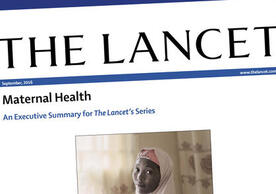
An estimated 300,000 women worldwide die every year during pregnancy, childbirth, or soon after, and nearly 3 million infants die in the first month of life. Prioritizing research into midwifery – particularly on family planning, preterm births, and high-quality care – can help address these unacceptably high rates of death for newborn children and women giving birth, according to a study led by YSN’s Professor Holly Powell Kennedy and published in The Lancet Global Health.
 “Investment in these priorities has the potential to enable the rights of women and children to life and to health, and help women, infants and families to survive and thrive,” said Kennedy, the Executive Deputy Dean at YSN and Helen Varney Professor of Midwifery.
“Investment in these priorities has the potential to enable the rights of women and children to life and to health, and help women, infants and families to survive and thrive,” said Kennedy, the Executive Deputy Dean at YSN and Helen Varney Professor of Midwifery.
“Conducting the research prioritized by global leaders and applying the findings across healthcare settings could be transformative for families, communities and science,” she noted.
In The Lancet’s Series on Midwifery, published in 2014, experts identified midwifery as a cost-effective and fundamentally important element of quality care, with the potential to improve maternal and newborn survival, health and wellbeing around the world. That spurred this latest research to determine where the greatest impacts could be made and research funds channelled to best effect.
With input from the global Partnership for Maternal, Newborn and Child Health (PMNCH), views have been gathered from interdisciplinary professionals, researchers, decision makers, and women’s groups around the world regarding how research into midwifery could be prioritised to substantially address these pressing healthcare problems. Four key areas have been identified:
- - improving provision of effective family planning
- - reducing rates of preterm birth
- - provision of high-quality care for all women and babies
- - promoting sustainable health systems and reducing the use of unnecessary interventions
The World Health Organization (WHO), UNFPA (United Nations Population Fund) and the International Confederation of Midwives are among the global institutions who have contributed to the new report.
“Ensuring we have the latest evidence to guide how we improve quality of care is essential to the Sustainable Development Goals and the implementation of The Global Strategy for Women’s, Children’s and Adolescents Health,” said Fran McConville, Midwifery Adviser, Department for Maternal, Newborn, Child and Adolescent Health, at WHO. “Addressing the research priorities in this paper will ensure the right actions are taken to provide quality midwifery care for all women and newborns so that no one is left behind.”
Dr Laura Laski, Chief of UNFPA’s Sexual and Reproductive Health Branch, said, “Setting up research priorities for quality maternal and newborn care is a big step towards ensuring quality midwifery for women and their families.”
She added, “Very practically, the findings will inform UNFPA’s Midwifery Programme that has been rolled out in more than 40 countries. The Lancet Series on Midwifery 2014 and this research agenda continue to inspire our work in sexual and reproductive health and rights, including our focus on first-time young mothers and young midwife leaders.”
Professor Mary Renfrew, of the University of Dundee, and principal investigator for The Lancet Series on Midwifery, said, “Midwifery is a very important but rather neglected area that needs more research funding to contribute to building knowledge about what are really big, intractable problems. This new work – which draws on the voices of women’s groups as well as professionals and academics - moves us closer to that by identifying where we can really make a transformative difference.”
The research was supported with funding from the Bill & Melinda Gates Foundation and the Norwegian Agency for Development Cooperation.
Dr. Jerker Liljestrand, Senior Program Officer, Maternal Health, Maternal, Newborn and Child Health at the Bill & Melinda Gates Foundation, said, “As shown in the recent Lancet Maternal Health series, strengthening midwifery is one way to avoid some of the risks of over-medicalization of birth in high and middle income countries.
“The new Maternal Health series adds to the previous work of the Lancet Series on Midwifery, showing how midwifery is a very cost-effective way of saving the lives of mothers and newborns in low and middle income countries. But there are many research issues to explore in order to understand how midwifery can best be a vehicle to better maternal, newborn and reproductive health. This new paper sets out the research agenda for optimizing midwifery.”
Additional Resources
- Holly Kennedy’s Comment on Lancet Global Health Series, Asking different questions: research priorities to improve the quality of care for every woman, every child
- Full Lancet Series on Midwifery
- Executive Summary
- New Lancet Series on Maternal Health
